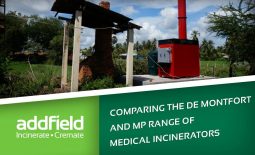
Cambodia like many developing countries is facing a crisis caused by a rapidly growing population and the amount of medical waste that is being created as a result. There is a drastic shortage of reliable and environmentally sustainable facilities in many hospitals and health facilities across the country. Safe disposal of medical waste is essential at all times, more so in current times as the global Coronavirus pandemic continues to ravage many countries.
Officially Cambodia appears to be succeeding in its battle according to current data however were the coronavirus to take a hold in the country the need for reliable facilities, sanitation and waste management would be critical to their ability to combat the situation.
This lack of facilities is being addressed through a joint project between the United Nations Office for Project Services (UNOPS) and World Health Organisation (WHO) working with UK based Addfield Environmental Systems Ltd alongside German based Fleischacker.
The program aimed at saving lives through improving the infrastructure across many hospitals across Cambodia is focussing on providing modern health care facilities, water sanitation and waste management. The locations that these machines are going to are undergoing great levels of regeneration as part of these greater projects.
Addfield have been selected to support the program through the provision of 8 MP100 Medical waste incinerators. Alongside providing full support for the installation and commissioning remotely and ongoing advice on the appropriate ways to develop and maintain waste management facilities.
“Medical waste is often overlooked when considering hospital facilities. We know from experience it is essential for a safe environment. It covers a massive spectrum of waste from gloves and face masks through to needles and syringes and bio-organic matter. Each piece of waste could potentially spread diseases if it is not taken care of properly. We have supplied machines to Cambodia in the past and have seen what a difference one of our machines can make for years to come.
It is a pleasure to be able to provide solutions that we know will deliver measurable improvements. For the people working at the hospitals and working with the machines daily through to the local community that won’t be subjected to hazardous waste, discarded needles and medical waste. We are all really looking forward to seeing these machines in operation.” Derek Carr, Operations Director Addfield Environmental Systems
Addfield has worked in partnerships with Fleischacker, who, in addition to having their head offices in Germany also operate additional offices throughout Asia, which has given them an unmistakable insight into the region and grassroots requirements.
Fleischaker chose to work with Addfield and specifically selected the MP100 machines based heavily upon the reputation that they have earned during the past ten years of working with international aid agencies, and the consistency and reliability of their incinerators. Having reviewed previous missions they found the machines to be easy to use and were the most suitable for their needs as they have been designed specifically to be used for all types of medical waste compared to many more general machines that they have been offered in the past from alternative providers.
As Addfield has already installed medical waste solutions in Cambodia they have seen for themselves how waste has previously been handled. At hospitals and health centres without appropriate facilities or resources, it was not uncommon to see medical waste mixed with general municipal waste, burned in open fire pits, and often spread on land. The impact that a dedicated facility can provide is genuinely remarkable.
Currently only a very small percentage of hospitals across Cambodia are capable of disposing of their waste securely through either on-site incineration or having access to a collection service to remove the segmented waste to a specialist thermal treatment plant.
The machines left Addfields facility in Staffordshire, England in late April and will be arriving in Cambodia in late May ready for installation and commissioning.
They are going to be installed in 8 hospitals including, Pursat Province Referral Hospital (PRH), Kampong Chhnang Province Referral Hospital (PRH), Kampong Cham Province Referral Hospital (PRH), Kampong Thom Province Referral Hospital (PRH), Baray Santouk Referral Hospital (RH), Kampong Speu Province Referral Hospital (PRH), Kep Province Referral Hospital (PRH), Oddor Meanchey Province Referral Hospital (PRH).




